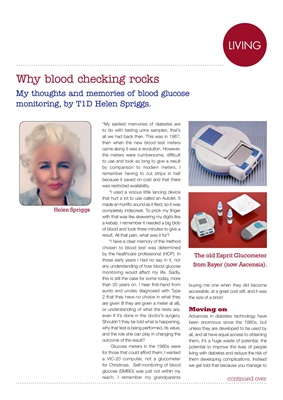
KITLIVING
continued over
Why blood testing rocks
My thoughts and memories of blood glucose
monitoring, by T1D Helen Spriggs.
Helen Spriggs
"My earliest memories of diabetes are
to do with testing urine samples, that's
all we had back then. This was in 1987,
then when the new blood test meters
came along it was a revolution. However,
the meters were cumbersome, difficult
to use and took so long to give a result
by comparison to modern meters. I
remember having to cut strips in half
because it saved on cost and that there
was restricted availability.
"I used a vicious little lancing device
that hurt a lot to use called an Autolet. It
made an horrific sound as it fired, so it was
completely indiscreet. To prick my finger
with that was like skewering my digits like
a kebab. I remember it needed a big blob
of blood and took three minutes to give a
result. All that pain, what was it for?
"I have a clear memory of the method
chosen to blood test was determined
by the healthcare professional (HCP). In
those early years I had no say in it, nor
any understanding of how blood glucose
monitoring would affect my life. Sadly,
this is still the case for some today, more
than 30 years on. I hear first-hand from
aunts and uncles diagnosed with Type
2 that they have no choice in what they
are given (if they are given a meter at all),
or understanding of what the tests are,
even if it's done in the doctor's surgery.
Shouldn't they be told what is happening,
why that test is being performed, its value,
and the role she can play in changing the
outcome of the result?
Glucose meters in the 1980s were
for those that could afford them; I wanted
a VIC-20 computer, not a glucometer
for Christmas. Self-monitoring of blood
glucose (SMBG) was just not within my
reach. I remember my grandparents
buying me one when they did become
accessible, at a great cost still, and it was
the size of a brick!
Moving on
Advances in diabetes technology have
been enormous since the 1980s, but
unless they are developed to be used by
all, and all have equal access to obtaining
them, it's a huge waste of potential, the
potential to improve the lives of people
living with diabetes and reduce the risk of
them developing complications. Instead
we get told that because you manage to
The old Esprit Glucometer
from Bayer (now Ascensia).